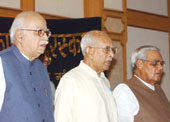|
|
| BATTLE LINES: (From left) L.K. Advani, K.S. Sudarshan and A.B. Vajpayee |
When an eclectic group of Hindu leaders and intellectuals gathered for a closed-door thinkers? meet in Bhopal?s Ashok Lake View hotel late last month, it was meant to be a sort of relaxed brainstorming session where the past is reviewed and ideas for the future are tossed in the air. That?s until a paper was read out by Sudheendra Kulkarni, a former Prime Minister?s Office (PMO) aide, regarded as close to top Bharatiya Janata Party (BJP) leaders, Atal Bihari Vajpayee and Lal Krishna Advani.
Speaking before the Rashtriya Swayamsevak Sangh (RSS) Sarsanghachalak K.S. Sudarshan and his deputy Mohan Bhagwat, he delivered a speech that shellshocked the select gathering. Expounding on the need to reach out to Muslims and the futility of chasing the ?so-called Hindu vote?, he almost threw down the gauntlet at the RSS top brass. ?One could see that a storm was building up,? says a pro-Hindutva intellectual who attended the meet.
The storm finally broke out last week, and out came the Sudarshan chakra. The paper, seen by some as an arrogant assault on the notion of Hindutva, could well have provoked the RSS supremo to launch an elegantly-delivered but extremely scathing attack against the BJP?s aging leaders, Advani and Vajpayee, in a TV interview. He was emphatic about the need to change the party?s leadership and made it clear that Vajpayee didn?t figure in his list of great post-Independence leaders. And, he also criticised the former Prime Minister for persisting with an allegedly double-crossing aide and for pandering to nepotism. ?It came as a bolt from the blue,? says Brajesh Mishra, the aide in question.
Winds of change
The outburst sent seismic shocks across the Hindutva spectrum. Advani wanted to resign. Vajpayee is said to have felt ?deeply hurt? and ?humiliated?. Both the Sangh and the BJP immediately went into a combined damage control exercise. RSS spokesperson Ram Madhav?s reaction was muted. ?Sudarshanji was only talking about a general principle on the need for a younger leadership,? he says.
But Sangh-watchers believe that Sudarshan?s hard talk highlights the Hindu organisation?s eagerness to see a change in the BJP leadership, regain better control over the party apparatus and guide it to its own preferred direction. Says a former senior BJP leader, ?The RSS and other parts of the Sangh parivar are concerned that their collective future would be in the dark unless they get the BJP to get rid of a particular group that prevails in the party today?.
The Sangh has never been greatly fond of Vajpayee. And in recent times, has not been as enamoured as it earlier was of the once-hardliner Advani. Clearly, it wants a bigger say in the BJP?s political life ? on policies and organisational restructuring ? after the Vajpayee-Advani era. The Sangh, sources say, wants to improve the image of the party which nosedived, more so because some leaders were seen to be aligning themselves with a particular business house or getting embroiled in questionable deals.
Zone of conflict
Since the BJP-led National Democratic Alliance (NDA) ruled the Centre between 1998 and 2004, the party?s equation with the RSS has been redefined to the latter?s disadvantage. In an article written in the Organiser in 1979, ideologue KR Malkani described the RSS as ?some kind of an institutional rajguru.? Says Madhav: ?It?s an ideological umbilical cord that binds us.? The BJP, in other words, is the political progeny of the RSS.
But with ideology and governance often coming into conflict ? especially since the BJP was heading a multi-party coalition ? the RSS had plenty to say but little of it was addressed. For instance, Sudarshan?s plea that the government needs to look at the issue of atrocities on Hindus in Bangladesh went unheeded.
The BJP was walking another line. Advani once told RSS bosses that every ideology had to be flexible. ?Even the Marxists have adjusted to the changing world. So must we.? At Jaipur last year, he even urged supporters shouting ?Jo Hindu hit ki baat karega, woh desh pe raaj karega? to change their slogan to ?Jo rashtra hit ki baat karega woh desh pe raaj karega?. But now, with the BJP suffering a sharp loss in the Lok Sabha polls last year, the RSS is keen to mould the party into a unit that stays closer to the Hindutva line.
Sources say that whenever the BJP formed a government in a particular state, the RSS too enjoyed the fringe benefits such as getting swayamsevaks appointed as teachers in government schools.
That apart, in 1998, when the Vajpayee government was being sworn in, Sudarshan, then the Sangh general secretary, is said to have got Jaswant Singh?s name deleted from the list of ministers. .
The RSS wanted more. When Vajpayee roared back to power a third time in 1999, the Sangh was hoping that the BJP would push for one of its three core issues: building the temple in Ayodhya, framing a Uniform Civil Code and abolishing Article 370 in Kashmir. However, little progress was made in any of them. Says a BJP insider, ?From making changes in cabinet formation to not being consulted on any major policy decision was a major shift in attitude.?
The gap widens
RSS leaders also felt that the party could have initiated a debate on the Uniform Civil Code. ?At least, it could have set up some kind of a commission,? says the insider.
There were various differences on the economic front too. And to sort them out, Dattopant Thengadi, the boss of Bharatiya Mazdoor Sangh (BMS), the trade union wing of RSS, wasn?t even granted an audience with the then PM. After the WTO?s Seattle summit, says a source, Sudarshan went deep into the issue, and took a strident anti-globalisation line. ?He seemed to have no economic meeting point with the government,? says a BJP insider. The party even overlooked questions raised by the RSS regarding the integrity of certain ministers.
Among the obvious reasons offered by the BJP for this gap between what the RSS wanted and what it was able to get was that the party did not have the mandate. Nonetheless, many RSS leaders felt they were not being treated with the deference they deserved. After all, the BJP had always been dependent on the RSS network during elections.
The fall-out has resulted in a variety of RSS-sponsored moves to rein in the BJP. There have also been noises, especially by the VHP, to float another Hindu party. And, during the 2002 Jammu and Kashmir state assembly elections, Jammu State Morcha, another Hindu party backed by the RSS, fought alongside the BJP. Both parties cancelled each other out.
The RSS desire to control the BJP stems from its fear that the latter might be controlled by non-RSS men with a marginal interest in the Hindutva agenda. ?They want to prevent such a scenario,? says DR Goyal, author of the seminal work, RSS. ?The battle,? he says, ?is between the core RSS cadre committed to Hindutva and that small section of the BJP which considers political power more important than ideology.?
Goyal feels that the contradictions have partly emerged from the different social bases of the two organisations. The RSS, he says, primarily has a lower middle-class base in small towns whereas the BJP has a more urban, middle-class constituency.
The RSS cadre would like to be accommodated in government jobs and be helped by the BJP in this endeavour. BJP?s upper middle-class base would like to enjoy the good life. ?Hence their economic agendas too are at variance. The BJP is in favour of globalisation; whereas the Swadeshi Jagran Manch is backed by the RSS,? says Goyal.
When the BJP went down from 182 to 138 in the 14th Lok Sabha polls last year, it was the right time for the RSS to re-assert its line. In October 2004 in Hardwar, swayamsevaks criticised BJP leaders for having forsaken the Hindutva plank.
The RSS believes that the BJP will keep meandering meaninglessly if urgent and firm steps are not taken to steer the party in the right direction. The direction, if the television interview is taken as evidence, would mean Vajpayee and Advani bringing in fresh faces and watch the new leadership grow before their own eyes as paramarshkartas (advisers).
Party above all
RSS spokesperson Ram Madhav says that the organisation is not interested in individuals so long as the party keeps moving in the right direction. But Sangh watchers feel, that means only those who can have a better working relationship with the parent body and follow the path laid out by them will be pushed and propped up by the RSS (see box).
The question is, can the RSS control the BJP as it once did? A former BJP leader feels it is a Herculean task. He says that the leadership has already tasted power and there is a change in its style of functioning. ?And whosoever takes over will be following this path. Which is why the RSS is being doubly cautious,? he says.
Sudarshan?s remarks can be interpreted as a move designed to make the BJP walk the Sangh way. There?s no real danger though. All top BJP leaders still owe allegiance to the Sangh. In fact, Advani even called up Sudarshan and offered to give up the post of the party president after the interview was made public.
But sometimes, personal allegiance notwithstanding, contradictions do emerge in the running of a mass-based party and following the guidelines of an ideological rajguru.
The RSS Sarsanghachalak just wants to make sure that the flock doesn?t stray. He wants change in the BJP to be able to control it better. And, that?s what the RSS intends to pursue in the coming months.
the super six
Sushma Swaraj
• RSS supremo K.S. Sudarshan had a good word for the BJP leader during the TV interview. Said to be among Advani’s favourites.
Rajnath Singh
• Liked by the Sangh for being a good organiser. Gets along well with party workers. More so because he comes from the Hindi heartland.
Arun Jaitley
• Is media-savvy. His elevation could mark a radical break from the past. Can be projected as the new modern face.
Narendra Modi
• The RSS rank and file’s favourite. Bahut dum hai, they say. Sangh leaders like him for his work in Gujarat. But fear they might be undermined by his domineering ways.
George Fernandes
• The Janata Dal (United) leader is being propped up as the outsider who could be a replacement for Vajpayee as an acceptable NDA leader.
Murli Manohar Joshi
• Once a firm favourite. His being not a team player is what many dislike about him. But he still has his backers.











